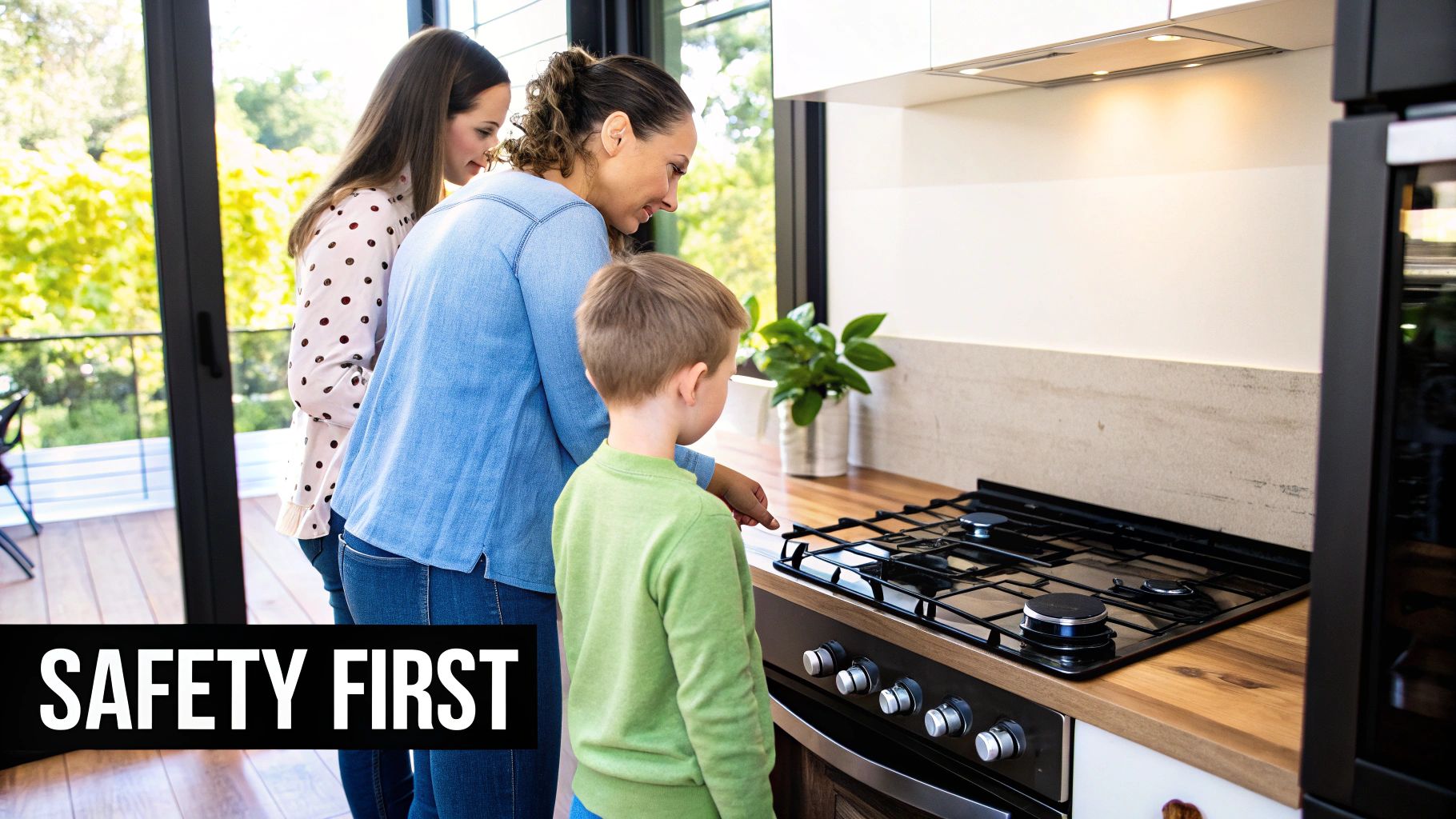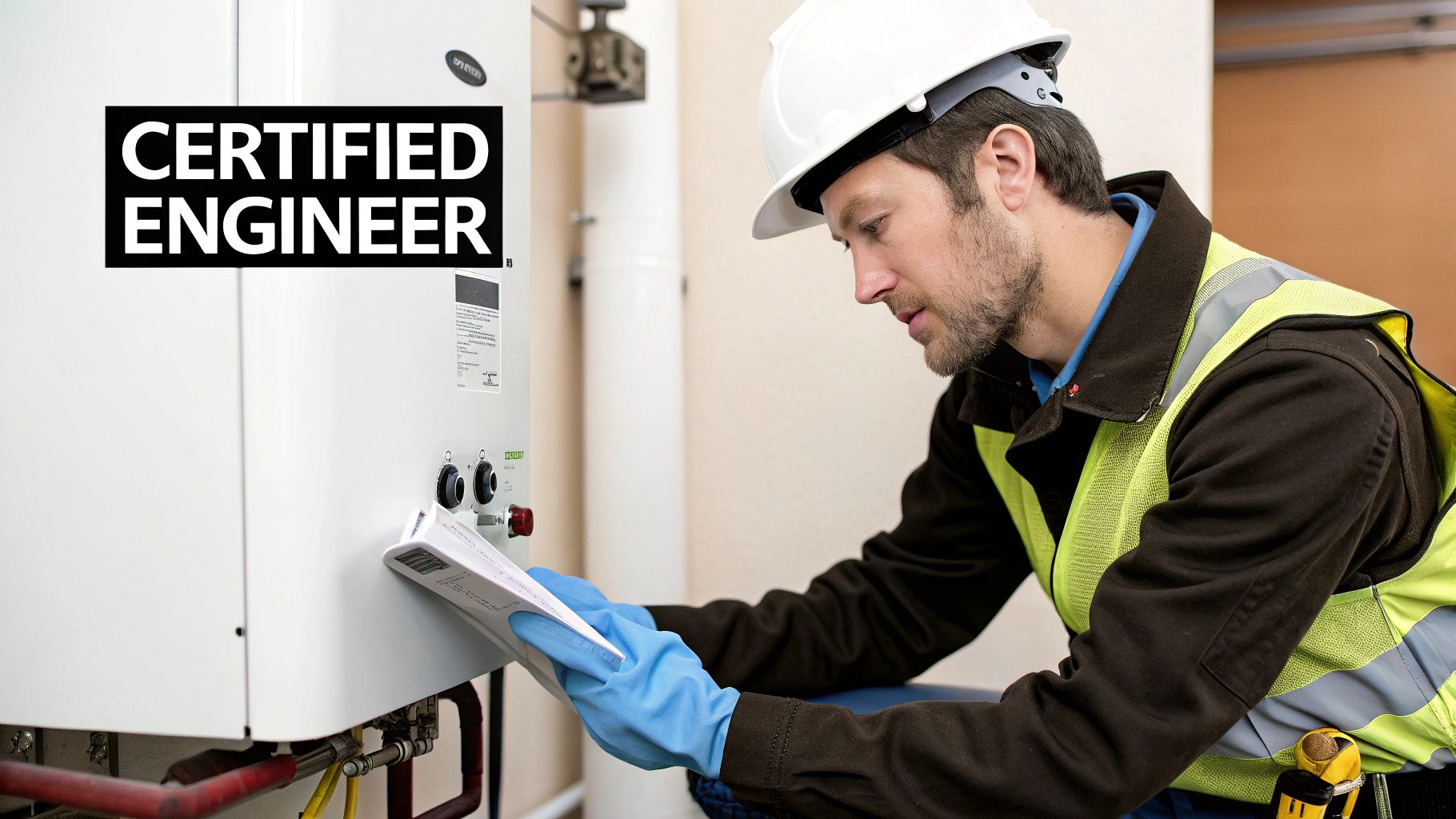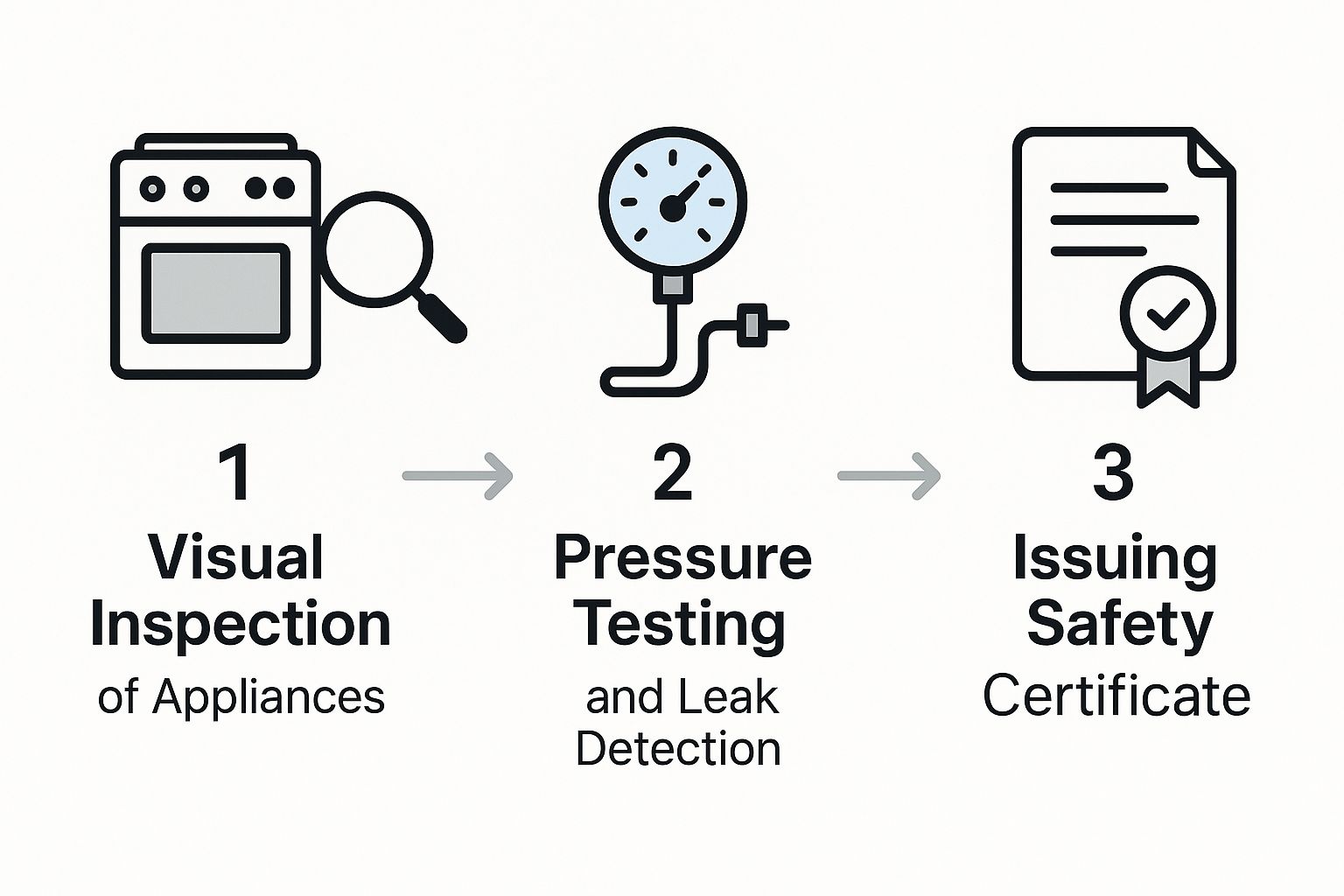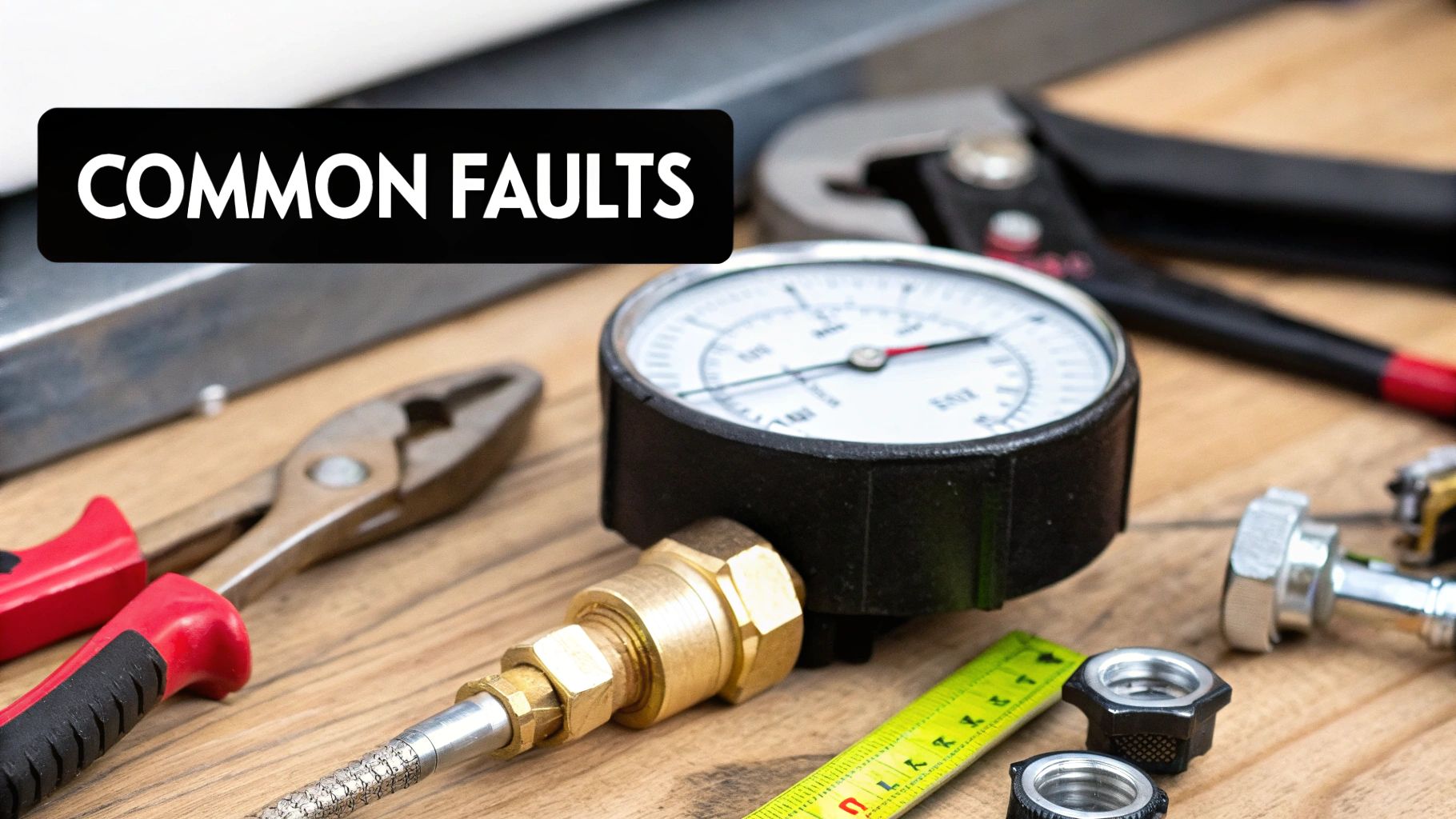Eastbourne's Annual Gas Safety Check Guide
- Luke Yeates
- Sep 1, 2025
- 9 min read
Think of an annual gas safety check as an MOT for your home's gas system. It's not just a box-ticking exercise; it’s a thorough inspection designed to confirm every gas appliance, pipe, and flue is working correctly and, most importantly, safely.
For landlords across Eastbourne, from the Victorian terraces in Old Town to modern flats in Sovereign Harbour, this yearly check is a non-negotiable legal duty. For homeowners, it’s all about peace of mind—knowing your family is protected from hidden dangers. For example, a family we recently visited in Hampden Park had a small, undetected flue issue that our engineer spotted during a routine check, preventing a serious carbon monoxide risk before it could develop.

Who Needs This Check and Why?
So, who's responsible for booking one of these checks? It really boils down to two groups:
Landlords: Under the Gas Safety (Installation and Use) Regulations 1998, it’s a legal requirement. Getting this wrong can lead to serious penalties, so it’s something to take very seriously.
Homeowners: While it's not a legal must-have for you, it is strongly recommended. Think of it as your first line of defence against potential hazards like gas leaks or carbon monoxide poisoning.
A qualified Gas Safe registered engineer—like the experts here at Harrlie Plumbing and Heating—will meticulously examine your entire system. Our job is to spot any potential issues before they have a chance to become dangerous, giving Eastbourne residents complete confidence in their homes.
To break it down, here’s a quick overview of what a gas safety check involves.
Gas Safety Check at a Glance
Aspect | Description |
|---|---|
What is it? | An annual inspection of all gas appliances, flues, and pipework. |
Who performs it? | A qualified and registered Gas Safe engineer is the only person authorised to do so. |
Why is it needed? | It ensures all gas systems are operating safely, preventing leaks and carbon monoxide risks. |
Legal Status | A legal must for landlords; a highly recommended safety measure for homeowners. |
Outcome | You receive a Gas Safety Record (CP12 certificate) detailing the findings. |
Ultimately, this check isn't just about ticking a compliance box. It’s about creating a safe living environment for everyone, whether you're a landlord with a duty of care to your tenants or a homeowner looking after your own family.
An annual check ensures the safe operation of your gas installations, preventing potentially life-threatening situations. It’s a small yearly task that provides immense protection for your property and its occupants.
Your Legal Duties as an Eastbourne Landlord
If you’re a landlord in Eastbourne, the Gas Safety (Installation and Use) Regulations 1998 isn't just a bit of friendly advice—it's the law. Your absolute core responsibility is making sure every gas appliance, piece of pipework, and flue you provide for your tenants is safe and properly looked after.
This isn't a one-off job. The law requires you to schedule an annual gas safety check with a certified Gas Safe registered engineer. Think of it this way: if you rent out a flat in the Sovereign Harbour area, you are legally bound to get the boiler and gas hob checked every 12 months. No exceptions. At Harrlie Plumbing and Heating, we work with many Eastbourne landlords to manage these schedules, ensuring they never miss a deadline.

Providing the Gas Safety Record
Once the engineer has given the all-clear, your next step is to share the Gas Safety Record with your tenants. The timeframes for this are set in stone and aren’t negotiable.
For new tenants: You must hand them a copy of the current certificate before they even move in.
For existing tenants: You have 28 days from the date of the check to provide them with the new certificate.
Keeping these documents in order is crucial for staying compliant. The law also states you need to keep a record of each check for at least two years. Our guide on what a gas safety certificate is breaks this down in more detail for landlords.
The Consequences of Non-Compliance
Let’s be clear: failing to meet these legal duties can land you in serious trouble. This isn't just a minor slip-up. The consequences range from hefty fines and even imprisonment to potentially making your landlord insurance invalid.
Partnering with a trusted local expert like Harrlie Plumbing and Heating ensures you meet these legal duties reliably and keep your tenants safe. We help Eastbourne landlords stay compliant and protect their investments.
It’s a bigger issue in the rental sector than you might think. A 2023 report revealed that a shocking 26% of UK rental properties failed their initial gas safety inspection. These failures were often found in older properties, like some of the lovely Victorian-era homes around Eastbourne, which can have ageing pipework that needs a professional eye.
What Happens During a Gas Safety Inspection
When one of our Gas Safe engineers from Harrlie Plumbing and Heating pops round to your Eastbourne property, they follow a methodical process that’s all about guaranteeing your safety. This isn't just a quick look at your boiler; it’s a systematic series of checks where no stone is left unturned.
First things first, the engineer will carry out a full visual inspection. Imagine they’re in a home in Roselands; they’ll check the boiler, gas hob, and any gas fires for correct installation, clear ventilation, and any obvious signs of damage or wear and tear. This initial once-over helps flag any immediate issues before the more technical tests begin.
Key Stages of the Inspection
Next up, the engineer gets down to the technical checks. These are absolutely vital for making sure everything is working exactly as it should and for spotting invisible dangers like tiny gas leaks or inefficient combustion.
This infographic breaks down the core workflow of an inspection, from that first visual check all the way to the final certificate.

As you can see, the process flows logically from observation to diagnostic testing. It’s all about building a complete picture of your system's health before any paperwork is signed off.
The engineer will then perform a gas tightness test. This involves checking the entire network of pipes, from the meter right up to each appliance, to make completely sure there are no leaks. Even a minor leak can pose a serious risk, so this step is non-negotiable.
After that, they'll test the operating pressure of your appliances. This confirms that gas is flowing at the correct rate, which helps the appliance burn fuel safely and efficiently. It’s a key part of preventing the production of nasty by-products like carbon monoxide.
A critical part of the annual gas safety check is the inspection of all flues and chimneys. The engineer makes sure that harmful exhaust fumes are being safely directed outside your property, a vital step in preventing carbon monoxide build-up.
Final Safety Checks and Documentation
The last stage involves testing all the safety devices. For example, your boiler will have a flame failure device designed to cut off the gas if the flame goes out. Our engineer will deliberately test this function to confirm it’s working correctly.
These annual checks are standard procedures carried out by certified Gas Safe Registered Engineers right across the UK. A typical safety check takes around 30 minutes, though this can vary depending on how many appliances you have. You can find more insights on what a gas safety check involves over at lettingaproperty.com.
Once all the checks are complete and everything gets the green light, you’ll be issued with your Gas Safety Record.
How to Read Your Gas Safety Record
After your annual gas safety check, you'll get a Gas Safety Record, often called a CP12. This document might look a bit technical at first glance, but it’s your official proof that everything is in order and a vital report on the health of your gas appliances. Knowing how to read it is key.
The record starts with the basics: the property address, the inspection date, and the details of the Gas Safe registered engineer who carried out the check. This first section is your assurance that a qualified professional has signed off on your property's safety.

Understanding Defects and Safety Actions
The most critical part of the document is the appliance checklist. Here, you'll find a detailed breakdown of every appliance inspected, along with the results of key safety tests for things like gas tightness, operating pressure, and flue performance.
If the engineer finds any issues, they will be clearly noted and categorised. For instance, if a boiler in an older Meads Village property had poor combustion readings, the engineer would classify the defect by its severity:
Immediately Dangerous (ID): This means the appliance is a serious, immediate threat to life and must be disconnected right away.
At Risk (AR): The appliance has a fault that could become dangerous. It must be turned off and not used until it's repaired.
Not to Current Standards (NCS): The appliance is safe to use but doesn't meet today's more stringent regulations.
At Harrlie Plumbing and Heating, our engineers always take the time to walk you through the report. We make sure you understand any findings and what steps are needed to keep your Eastbourne property safe.
This system gives you a clear action plan for any necessary repairs. For a complete overview, you can [read our easy guide on how to get a gas safety certificate in the UK](https://www.harrlieplumbing.co.uk/post/how-to-get-gas-safety-certificate-in-the-uk-easy-guide). It offers even more detail on the entire process, from start to finish.
The Hidden Dangers a Safety Check Prevents
Beyond just ticking a legal box, an annual gas safety check is really all about protecting your family. The biggest threat it tackles is carbon monoxide (CO) poisoning—often called the 'silent killer' because you can't see, smell, or taste it.
CO is produced when fuel doesn't burn properly. That means a faulty boiler or an old gas fire could be releasing this dangerous gas without you having any idea. The early symptoms, like headaches and nausea, are worryingly easy to dismiss as just a touch of flu. A thorough safety check from a professional ensures your appliances are working correctly, stopping this invisible danger at its source.
The inspection also hunts for gas leaks, which carry a massive risk of fire or even explosion. For a family living in a terraced house in Eastbourne's Old Town, this yearly check isn’t just routine maintenance—it's a critical safety measure that keeps their home the safe haven it should be.
The Scale of the Risk
You might be surprised at how common these dangers are. In fact, a 2022 analysis revealed that roughly 1 in every 6 properties on a typical British street has at least one dangerous gas appliance. That's a staggering 16.7% of homes potentially at risk if they aren't inspected regularly.
Carbon monoxide poisoning is a serious threat that a gas safety check directly addresses. Knowing the symptoms is crucial, but preventing its production in the first place is the ultimate goal of any responsible homeowner or landlord.
If you ever think there's a problem, knowing [what to do if your carbon monoxide alarm goes off](https://www.harrlieplumbing.co.uk/post/what-to-do-if-carbon-monoxide-alarm-goes-off-essential-safety-tips) is essential knowledge that could save a life. Ultimately, the best strategy is prevention, and that means getting a professional in for a regular check-up on any home with gas appliances.
Got Questions About Your Gas Safety Check? We've Got Answers
Even when you know the ropes, it's completely normal to have a few lingering questions about your annual gas safety check. We’ve pulled together some of the most common queries we hear from homeowners and landlords across Eastbourne to give you the clear, simple answers you need.
How Long Does a Gas Safety Check Actually Take?
A standard gas safety check is usually done and dusted in about 30 to 60 minutes. The final time really just depends on how many gas appliances we need to look at in your home. It’s important that someone over the age of 18 is there to let our engineer in.
For landlords, it's a legal must to give your tenants at least 24 hours' written notice before a visit. Here at Harrlie Plumbing and Heating, we always work with you and your tenants to find a convenient time, making sure there’s as little disruption as possible.
Is a Gas Safety Check the Same as a Boiler Service?
That’s a brilliant question, and the short answer is no, they are two different things. It’s a bit like the difference between an MOT and a full car service.
An annual gas safety check is the legally required inspection to confirm your appliances are safe to operate. Think of it as that essential safety MOT for your gas system.
A boiler service, on the other hand, is all about proactive maintenance. This is where we get under the bonnet, cleaning parts and making fine-tuned adjustments to boost your boiler's efficiency and help it last longer.
While a full service does include all the necessary safety checks, it goes much deeper. We often suggest to our Eastbourne clients that they book both together. That way, you get total peace of mind knowing your system is not only safe but also running as efficiently and reliably as it can.
What Happens If an Appliance Fails the Check?
If our engineer spots a fault, they’ll follow a strict, official process known as the Gas Industry Unsafe Situations Procedure (GIUSP). If an appliance is flagged as ‘Immediately Dangerous’ (ID), it will be disconnected right there and then for your own safety.
An appliance can also be marked as ‘At Risk’ (AR). This means it has a fault that could become dangerous. In this case, it will be turned off, and you'll be strongly advised not to use it until it’s been properly repaired.
Don't worry, these findings are all clearly noted down on your Gas Safety Record. Our engineer will walk you through the problem on the spot and give you a straightforward quote for any repairs needed to get your home safe and compliant again.
For a reliable and professional annual gas safety check in Eastbourne, you need experts you can trust. Contact Harrlie Plumbing and Heating today to book your appointment and ensure your home is safe.

Comments